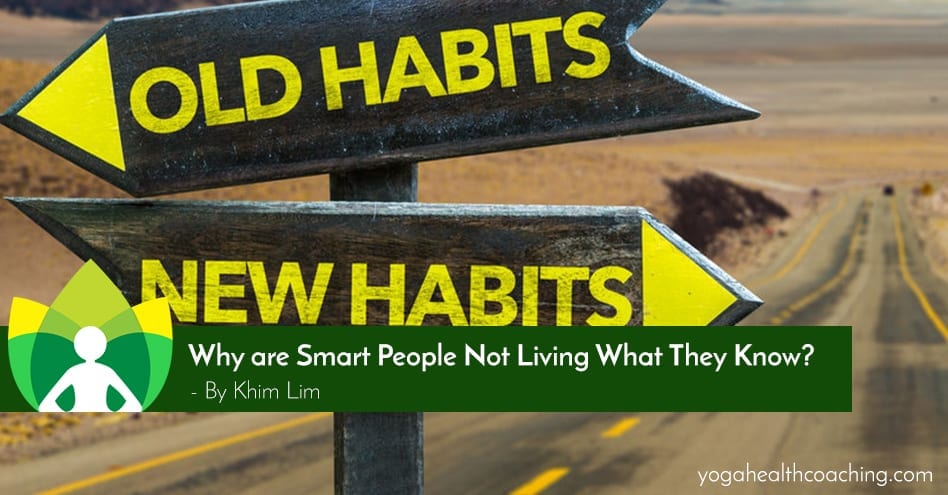
Why are Smart People Not Living What They Know?
Information is king (or is it?). Today you can find anything on the Internet from how to build your own airplane, how to make a million dollars online in 2 minutes to how to how to brush your cat’s teeth. If you are health conscious, you are probably looking to upgrade your own body system. You may be looking to treat a health condition. Or perhaps you want to upgrade your performance and know that a healthy body will get you there faster. You have probably already spent hours on the Internet or consulting books, friends or your local health professionals. And if you have applied any of the knowledge, are you satisfied with your results? If you are, keep up the good work! If not, read on..
Most of us have tried diets, exercise programs, herbal remedies or lifestyle regimes that have worked, for a period. We feel better and more optimistic about our future health… right up until life gets busy or our new routine disrupted. We get distracted, commitment and motivation lessen, until eventually we veer off the path entirely and are back to square one — feeling alone and frustrated.
Then you start to doubt your own knowledge, may be it wasn’t the right information that could actually help you. So you seek professional advice and get into the specialized program like Weight Watchers to make sure you get it this time. Wow! It works great and you are pumped. You said to yourself: “This is it. I’m on my way to an ever-improving health!”. Wouldn’t you know it, as the program ends, the vicious cycle begins like before. So you go on to try Herbal Magic, Jenny Craig, Dr. Bernstein and many more with short-lived results. Sound familiar?
Why was the result not long-lasting? Was it not having a clear and big enough goal or intention? Was it lack of discipline or sustainable motivation? What was actually lacking here that causes most people to fail in achieving their health goals?
Think Automation, Not Willpower
BJ Fogg, James Clear and Charles Duhigg are well known habit change experts that teach us how to automate new habits.
Let’s look at weight gain as an example. Studies have shown one of the contributors to weight gain is snacking (unhealthy snacks are worse). If you are a snacker, you know it is extremely hard to fight the temptation. When you feel the urge (James Clear called it “reminder”, Charles Duhigg called it “cue”) for a cookie, you want to pause, take a deep breath and ask yourself:
- What time is it?
- Where are you?
- Who are you with?
- What did you just do prior?
- What emotional state are you at?
The above 5 questions will determine the trigger of this habit of reaching out for a cookie or cookies.
Know Your Triggers, Shift your Habits
Let’s look at some examples of these triggers. Every afternoon around 2 pm (time), or when you are chatting with a co-worker, Mary (people), at a break in the cafeteria (place), or you just poured yourself a cup of coffee (preceding action), or when you feel alone and sad (emotional state). Say in this case, your trigger is feeling alone and sad.
In order to verify if the cookie is actually what you need to satisfy your urge, replace the cookie with another reward like celery stick or chocolate. Is the urge gone? If not, replace it with a completely unrelated reward like going for a walk, pick up a phone to call a friend, and keep testing until you find the new reward that satisfies your true need. Let’s say you conclude your need for cookie diminishes as you call a friend.
Great! Now that you have identified your reminder or signal for action as feeling alone and sad, and your reward is eating a cooking. You want to design a new routine or system for yourself by writing down a plan:
Each time I feel alone and sad (reminder), I will call a friend (routine) because it provides me with companionship and care (reward).
What is missing here is not the cookie, it is the feeling of companionship and care! When you get this, you can add in new habits that include friendship or social life.
- Take a moment to tap into your own desires for a healthier you. Ask yourself:
- What bad habits do you currently have now that stop you from getting healthy?
- Can you identify the real urge?
- What new habit can you add to your daily routine?
- How do you design your environment to make this new habit easy to do?
Slow and Steady Wins the Race
Studies shows this new behaviour will take root overtime and become automatic.
Slow and steady wins the race and you will see the compound effect of small changes overtime. Before you know it, these tiny healthy habits add up, and replace your outdated unhealthy ones. A new you emerges.





